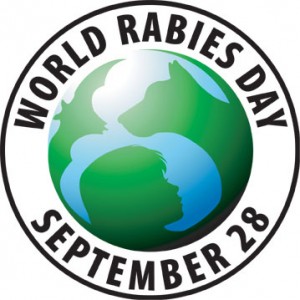
Are you asking yourself why we are posting about Rabies? Did you think that Rabies was eradicated, a disease of the past? Unfortunately these are common misconceptions.
The Minnesota Board of Animal Health reports that Rabies cases have substantially decreased over the last 100 years, but the fatal virus is not gone.
Please take a moment to learn more about Rabies in support of World Rabies Day.
What is Rabies?
Rabies is a neurological disease that is most often fatal. It is spread through saliva- specifically through the bites of infected animals.
Why is Rabies a big deal?
Rabies is often fatal and there is no cure after the appearance of symptoms (Minnesota Dept. of Health).
The AVMA reports that more than 55,000 people die each year from Rabies, https://www.avma.org/Events/pethealth/Pages/world-rabies-day.aspx. In addition, the CDC reports that US Public Health costs associated with Rabies are over $300 Million annually! http://www.cdc.gov/features/rabies/index.html
Which animals carry Rabies?
In Minnesota, skunks and bats are the most common carriers of Rabies, although other wild animals may also be sources. Bat bites can be particularly difficult to identify, as they are often so tiny the victim does not recognize that they have been bitten.
How do I know if my pet has been bitten or may be infected?
If your pet is bitten/scratched/fights with a skunk, bat, or other wild animal- the wild animal should be submitted for Rabies testing. Sometimes it is hard to tell that your pet has been bitten- always air on the side of caution!
Which animals do NOT carry Rabies?
In Minnesota, the Department of Health does not consider hamsters, guinea pigs, gerbils, rats, squirrels, chipmunks, rabbits or mice to be a rabies risk.
Is Rabies preventable?
YES YES YES! This is why there is a World Rabies Day. Keep your pet up to date on it’s vaccinations- even if you have an indoor cat or a dog that only goes outside to potty- there is a completely preventable risk of Rabies. Bats can get into your house unnoticed; rabid skunks have been known to aggressively approach pets and people. It is not worth the risk when there is a simple vaccination available.
The Minnesota Board of Animal Health shares the following recommendations for Rabies prevention:
-Keep dogs, cats, ferrets, and horses currently rabies vaccinated
-Vaccinate cattle and sheep if feasible
-Keep strays and wildlife (especially skunks and bats) away from pets and livestock
-Do not approach unfamiliar or wild animals; teach children to do the same
-Do not keep wild animals as pets
-Never leave children alone with any animal
-Report stray animals or animals acting unusual to local animal control
-Bat-proof your home
-Do not attract wild or stray animals to your home or yard
-Hunters and trappers should avoid animals with abnormal behavior
-Avoid contact with dogs and cats while traveling, especially internationally
Important Phone Numbers:
Questions About Pet or Livestock Exposure= 651-201-6808
Questions About Human Exposure= 651-201-5414
For more information on Rabies, check out the Minnesota Department of Health website:
http://www.health.state.mn.us/divs/idepc/diseases/rabies/rabies.html#bat
The Minnesota Board of Animal Health website:
https://www.bah.state.mn.us/rabies
The Global Alliance for Rabies Control:
http://rabiesalliance.org/

